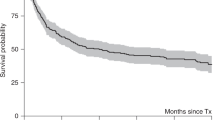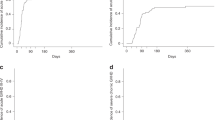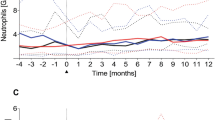Abstract
Autologous peripheral blood stem cell transplantation following myeloablative chemotherapy is being increasingly utilized in the treatment of a variety of malignancies. We administered busulfan 16 mg/kg orally, thiotepa 500–700 mg/m2 i.v., and carboplatin 800–1000 mg/m2 i.v. to 56 women with metastatic carcinoma of the breast. Autologous peripheral blood stem cells, which had been collected after a combination of chemotherapy and granulocyte colony-stimulating factor, were infused on day 0. The major toxicities of the conditioning regimen included severe pancytopenia, stomatitis, nausea, emesis, diarrhea, fever, and infection. Transplant-related mortality was 1.8%. The incidence of opportunistic viral infections was 42.9%. Fourteen individuals achieved a complete response. The actuarial survival at 1223 days was 13.7% for the entire group of patients; the actuarial survival at 1009 days was 39.3% among complete responders. The functional status of the immune system was determined following transplantation in a subset of patients. Peripheral blood mononuclear cells were obtained before and after stem cell infusion, and were analyzed phenotypically and functionally. Proliferative and interleukin-2 synthetic ability of these cells was assessed following stimulation with phytohemagglutinin and anti-CD3 antibody. The response to influenza peptides was also ascertained. Proliferative and interleukin-2 synthetic capacity was markedly impaired for over a year. Memory response was virtually absent for up to 2 years following transplantation. The prolonged and marked immunosuppression following this myeloablative regimen was associated with a high incidence of opportunistic viral infections, and may have contributed to disease relapse and progression especially in patients who failed to achieve a complete response following transplantation.
This is a preview of subscription content, access via your institution
Access options
Subscribe to this journal
Receive 12 print issues and online access
$259.00 per year
only $21.58 per issue
Buy this article
- Purchase on Springer Link
- Instant access to full article PDF
Prices may be subject to local taxes which are calculated during checkout
Similar content being viewed by others
Author information
Authors and Affiliations
Rights and permissions
About this article
Cite this article
Chakraborty, N., Bilgrami, S., Maness, L. et al. Myeloablative chemotherapy with autologous peripheral blood stem cell transplantation for metastatic breast cancer: immunologic consequences affecting clinical outcome. Bone Marrow Transplant 24, 837–843 (1999). https://doi.org/10.1038/sj.bmt.1701999
Received:
Accepted:
Published:
Issue Date:
DOI: https://doi.org/10.1038/sj.bmt.1701999
Keywords
This article is cited by
-
Macrophage-mediated anti-tumor immunity against high-risk neuroblastoma
Genes & Immunity (2022)
-
Impact of high-dose chemotherapy on antigen-specific T cell immunity in breast cancer patients. Application of new flow cytometric method
Bone Marrow Transplantation (2002)
-
Incidence and outcome of vancomycin-resistant enterococcal bacteremia following autologous peripheral blood stem cell transplantation
Bone Marrow Transplantation (2000)



